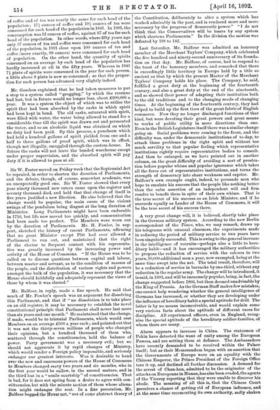Mr. Balfour, in reply, made a fine speech. He said
that much of Mr. Fowler's speech was an argument for dissolving this Parliament, and that if "no dissolution is to take place on an old register, it may be necessary to establish the novel constitutional principle that Parliament shall never last more than six years and one month." He maintained that the change, if made, would be to triennial Parliaments, which would cost Members on an average 2500 a year each ; and pointed out that it was not the thirty-seven millions of people who changed their opinions, but a hundred thousand of them who, scattered through the constituencies, held the balance of power. Party government was a necessary evil; but we should not aggravate it by rapid changes of Ministry, which would render a Foreign policy impossible, and seriously endanger our greatest interests. Was it desirable to hand over the new and enormous powers of the House of Commons to Members changed every two years and six months, who in the first year would be callow, in the second mature, and in the third lost in a "senile courtship " of constituencies. That is bad, for it does not spring from a desire to agree with con- stituencies. but with the minute suction of them whose aliena- tion might endanger the seat. In a fine peroration, Mr. Itaifour begged tin How not, "out of 40131Q abetract theory of
the Constitution, deliberately to alter a system which has worked admirably in the past, and is rendered more and more necessary by the progress of democratic power." "I do not think that the Conservatives will be losers by any system which shortens Parliaments." In the division the motion was defeated by 188 to 142.
































 Previous page
Previous page